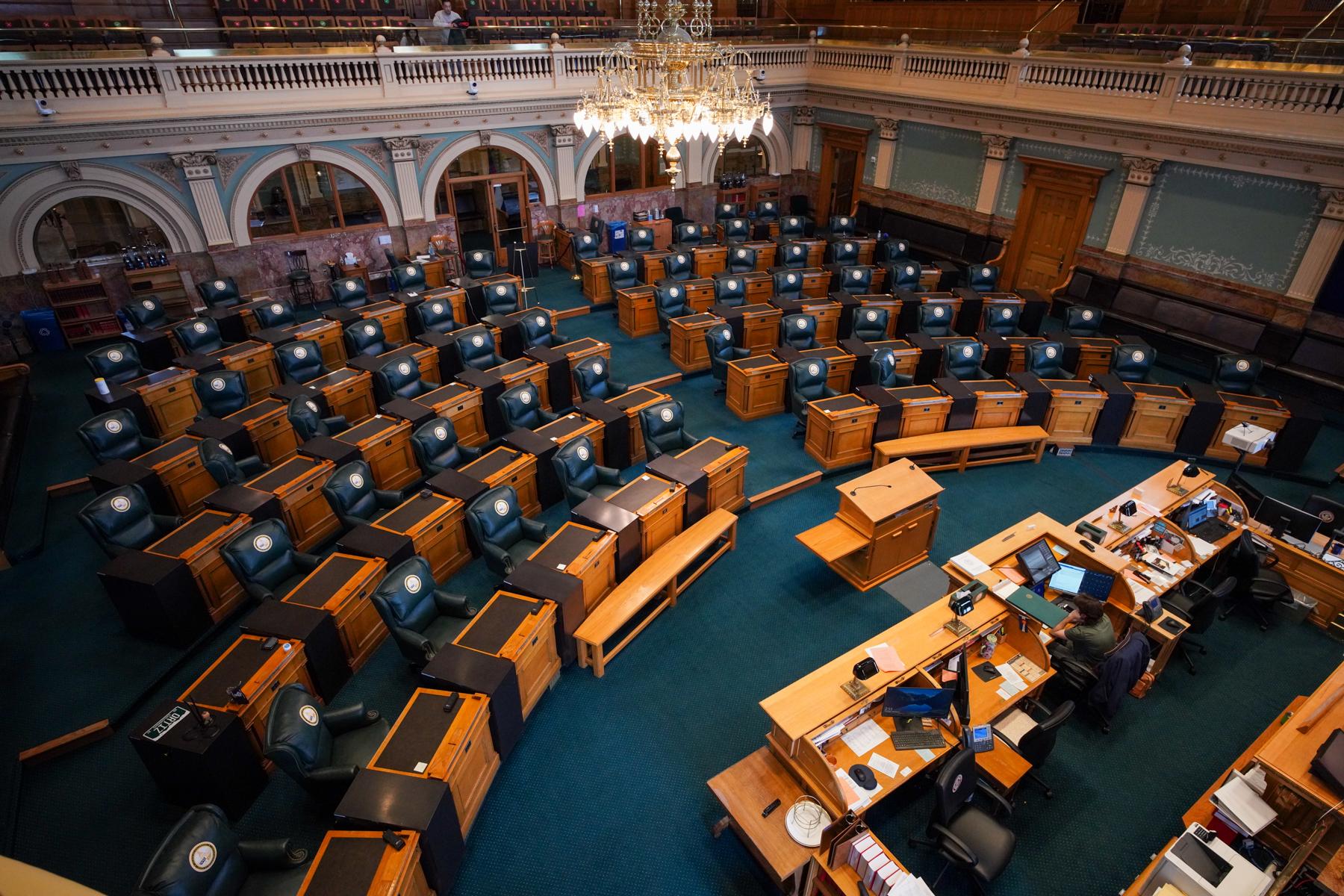
Updated 5:05 p.m., November 16, 2023
When state lawmakers return to the state Capitol on Friday for a special session, the main focus will be on lowering property tax rates — an urgent action, said Gov. Jared Polis, before a big tax increase hits many property owners next year.
But Democratic lawmakers also say they’ll take on several other tax issues that could affect a wider range of Coloradans, including those who don’t own property. The package is expected to include a $150 million expansion of a tax refund aimed at lower-income households, as well as a change to how the state pays out TABOR refunds next year.
“The governor's given us a great opportunity to deliver on the property tax crisis and rental crisis that so many Coloradans are facing right now,” said House Speaker Julie McCluskie, a Democrat.
Together, those measures could have a significant effect on the state’s TABOR surplus. As it stands, the state has $3.7 billion that it must return to taxpayers next year. The special session will route some of that money away from the well-known “TABOR refund” checks, and instead use it to pay for a range of other tax policies.
It’s a strategy that the legislature has used in the past. While the state can’t keep money over its annual revenue limit, Colorado’s lawmakers have the power to decide how exactly they refund it. They have previously used excess revenues to pay for a variety of tax changes to benefit various populations. Still, the new tax package is already drawing criticism from conservatives, especially after voters rejected Proposition HH, a broad proposal that included some of these ideas.
Here’s what’s likely to be on the agenda in the special session:
Granting a discount on taxable property value. This broad-based way to stunt property tax increases state wide is the topline reason lawmakers are coming back to work. They are likely to lower the taxable value of each property, meaning taxpayers’ bills won’t rise as quickly next year. This is the same approach used in previous years and that was proposed in Prop. HH. And it would result in comparatively less money going to schools and cities.
The package will match the residential tax cuts offered by Prop. HH, adding up to a difference of a couple hundred dollars for a typical home. The proposal would exempt $50,000 of each home from taxation. And the residential assessment rate — which determines the portion of the remaining value that is taxed — would drop from 6.765 percent to 6.7 percent.
As a result, a home worth about $500,000 in a typical taxing district could expect savings of roughly $200 compared to the status quo. (However, that reduction probably wouldn’t be enough to cancel out the increase in their tax bill caused by rising property values.)
The special session proposal does not offer any additional relief for business properties. But the discounts would come on top of $800 million of property tax cuts that were previously enacted for the upcoming tax cycle. Those earlier cuts did include commercial property.
“Flattening” TABOR refunds for next year. Typically, the state’s highest earners collect bigger TABOR refunds than lower-wage workers, since they paid more in taxes. If the state keeps the current model, analysts expect refunds next year would range from about $600 to nearly $2,000 per filer, depending on income.
But during the special session, the state legislature will instead consider paying out equal refunds of about $900 instead. That means about 62 percent of taxpayers would get a bigger check. But the smaller, higher-income groups could see their refunds shrink by up to $1,000 or so.
The state took the same flattening approach to refunds last year, branding it as the “Colorado Cashback.”
“It is a way to get the dollars out in a progressive way that supports all folks in the state,” McCluskie said. “When we did the flat refunds back in 2022, we heard how popular and welcome that relief was.”
But that idea faces objections from conservatives and others who argue that it goes against the idea that people with larger tax burdens should get larger refunds.
The size of refunds people see next year could also change if lawmakers approve some of the other policies they’re set to consider.
“Backfilling” the effects of the property tax reduction by giving state money to schools and cities. This is a strategy that has been used in prior years with bipartisan support. Since lower property tax rates mean comparatively less money for schools and cities, the state could tap its own funding sources to either partially or completely make up for the effects on local districts.
The legislature has already reserved $200 million of general funds for this purpose this year. Democrats originally talked about using some of the TABOR surplus for this purpose, which would have resulted in smaller refund checks. But they backed off of that idea, saying on Thursday that they would not use the refund money for backfill.
Democrats plan to ensure schools and fire districts are “made whole.” Any money remaining after that will go to cities and counties that have had slower revenue growth, according to Democratic leadership.
Republicans previously supported the approach of using TABOR dollars for backfill in a 2022 law. But Senate Minority Leader Paul Lundeen said his caucus now opposes that strategy, since it proved unpopular in the Prop. HH campaign.
“The people made it clear [with the failure of Prop. HH] that they did not like government being too clever by half, and that's why we're taking the position we're taking. The people have spoken with authority,” he said.
Hansen said the use of TABOR money is a reasonable compromise to ease property taxes while minimizing the effect on local districts. Republicans “will literally be contradicting themselves” by opposing it, he said.
Doubling the state Earned Income Tax Credit, a tax refund that is paid out to lower-income Coloradans.
At present, the state version of the EITC is worth only 25 percent of the federal EITC credit. So, for example, a single person with a child who gets a federal credit of about $2,000, receives $500 from the state — a quarter of the federal credit.
But under the Democratic proposal, the state credit in that situation would instead be worth $1,000 — half of the federal credit.
In all, EITC recipients could receive about $150 million in additional tax benefits, Hansen said. That sum would come out of the TABOR surplus pool, since it qualifies as a tax refund. The state has already been ramping up this tax credit in recent years, but the special session could make that expansion go faster and further.
Lundeen said he’s supportive of tax breaks for lower-income Coloradans, but wants to see that balanced out with cuts to government spending, not reductions in the refunds to others. And he believes it’s a debate that should wait.
“Now is not the time for that conversation. This is a property tax crisis moment,” he added.
Opting into a federal program for grocery assistance. Unrelated to all of the wrangling over tax policy, Gov. Polis has asked lawmakers to use their brief time back in the capitol to enroll the state in Summer EBT, a federal program that could offer low income households $120 per child for groceries next summer. The state must opt into the program by Jan. 1. It would cost Colorado about $3.5 million to run the program; in return, the federal government could provide more than $40 million in benefits, Chalkbeat reported.
Republicans have a property tax proposal, too
For their part, Republicans will present a counterproposal during the special session focused almost entirely on property taxes. Lundeen said their plan may offer $80,000 of upfront valuation discounts and drop the statewide assessment rate to 6.5 percent for residential properties, along with cuts for other properties too. That is a steeper cut than Democrats are planning for, adding up to more than $1 billion in property tax savings, Lundeen said.
But perhaps the biggest difference is in their approach to “backfill.” Lundeen said Republicans saw little need for cities, counties and other local districts to receive payments from the state as part of the package.
Even with a rate cut, many cities, counties and others would still see their revenues grow, since the tax base is expanding so quickly, Lundeen said. Under the Republican plan, the state would only pay to offset the effects on schools, as well as a more limited offering for local governments facing more severe budget situations. And that money, he said, should not come from the TABOR surplus.
“We are only interested in using state general fund dollars,” he said.
The special session convenes on Friday. It will last at least three days — the minimum period required to pass a bill into law — but could go longer, too.
Editor's Note: This story has been updated with additional information about the proposed property tax rate cuts









